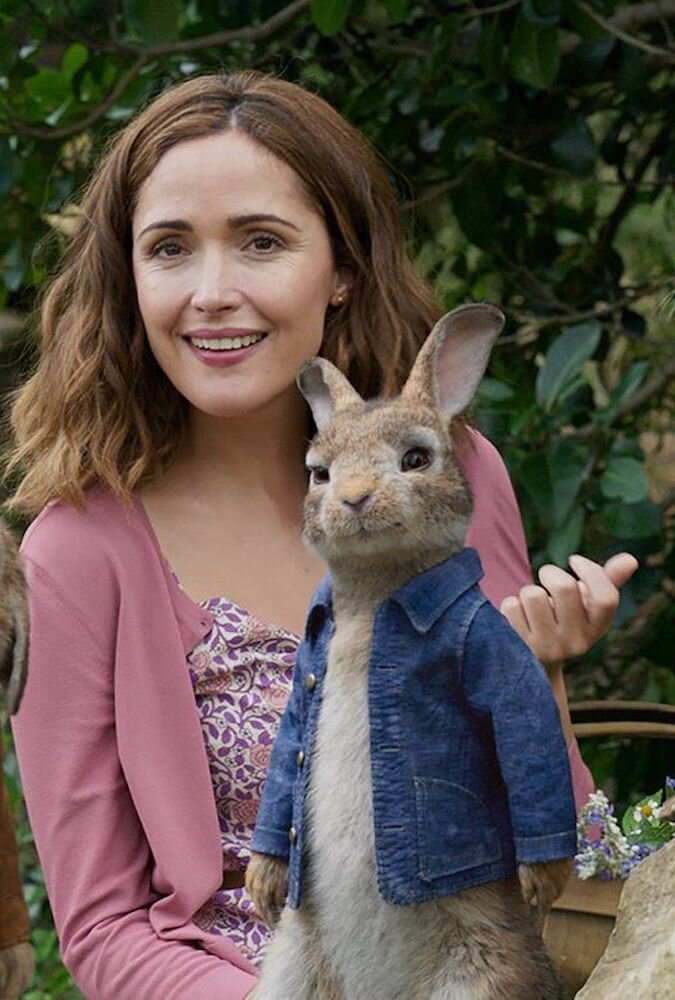Peter Rabbit
/“It’s like, who am I? Who are you? You know, like, we’re all connected, but with what rope?” [offers a female rabbit a carrot like it’s a bong]
~ Peter Rabbit
quick fox: D
winding dragon
When Sony Animations decided to introduce Beatrix Potter’s beloved rabbits to the modern age, they had at their disposal an abundance of examples from which to draw inspiration. Bugs Bunny uses operatic numbers and pronoun wordplay to pull off dastardly pranks, Thumper enjoys giving ice-skating lessons and imitating his father’s advice, Rabbit from Winnie the Pooh is a slightly-compulsive carrot farmer with a honey shortage thanks to a certain neighbor, and the thuggish Snowball from The Secret Life of Pets is a giant cotton ball on crack.
Of course, there’s always Potter’s original stories, “The Tale of Peter Rabbit” and “The Tale of Benjamin Bunny,” which probably would have been helpful if Sony had bothered to read them. I can only assume that they didn’t (despite the fact that you can read all the tales on Project Gutenberg for free), because there’s no possible way that Sony and director Will Gluck turned the main character of a children’s book—a young rabbit so nervous walking through Mr. McGregor’s garden that he lost half of the onions in his handkerchief—into a punk-ass, frat boy who thinks murder is an acceptable reaction to jealousy. And no, I am not exaggerating.
This *deep sigh* is Peter Rabbit.
Peter Rabbit (2018) stars James Corden as Peter Rabbit, a mischievous lagomorph whose favorite hobby is stealing vegetables from Mr. McGregor’s (Sam Neill) garden along with his three younger sisters—Flopsy, Mopsy, and Cottontail (Margot Robbie, Elizabeth Debicki, and Daisy Ridley)—and cousin Benjamin Rabbit (Colin Moody). One day, during a normal garden heist, Peter loses his blue jacket, which used to belong to Peter’s father before McGregor turned him into a rabbit pie. Peter returns to the scene of the crime for his jacket, but McGregor catches the rascally rabbit in the act. In the middle of the McGregor’s speech about how he’s going to go Sweeney Todd on Peter’s poofy tail, the old gardener has a heart attack (thanks to poor dietary habits) and dies. Technically, not Peter’s fault.
The rest of the movie, though, is Peter being…well, I’m trying to think of a polite way to say it. Juvenile delinquent? As soon as McGregor’s body is taken away, Peter turns the farm into a giant frat house, complete with a dandy pig dancing on a table, a fox wearing a tie around his forehead in reference to Rambo, and Peter Rabbit smoking a carrot like it’s a bong. But their fun is ruined when Thomas McGregor (Domhnall Gleeson), an uptight toy store manager, inherits the estate. Even worse, Thomas begins a romance with his new neighbor, Bea (Rose Byrne), who is a mother figure for the rabbits in place of their deceased parents. Thomas hates the pesky rabbits, and Peter hates Thomas for being a potential surrogate stepfather (do rabbits have wedding ceremonies?). Immediately, the two turn to cockeyed schemes and fist/paw-fights to sort out their rabbit-sized differences, and as expected, everyone else gets hurt in the process. Eventually, they realize they need to put their rivalry aside or could risk losing the Bea’s love.
Peter Rabbit is one of those films where someone needed to walk into Sony, take a look at the script, and whack the producers on the head with a carrot. All they needed to do was ask themselves, “What would Beatrix Potter do?” and hopefully someone would say, “Well, you know how Peter Rabbit’s going to try and murder Thomas McGregor in cold blood? What if we [dramatic pause] don’t do that?” *Collective gasp*
I’m not talking about one scene, either. Twice, Peter and his family concoct a scheme where the intention is to kill Thomas. The first time, they rewire an electrical fence (apparently, one of the rabbits has an engineering degree. If I were to guess, I’d day Cottontail) to force Thomas to fall from his roof. Peter then pokes Thomas in the eyeball and happily pronounces him dead. Fortunately, Peter is not a professional coroner, and Thomas survives. The second time, the rabbits hear that Thomas has a deathly allergy to blackberries, and purposely slingshot the forbidden fruit into Thomas’ mouth. If it weren’t for the fact that Thomas had an epipen in his pocket, the younger McGregor would have permanently turned into the same color as that blackberry.
I know I’m harping on the whole murder thing, but for the love of God, this is a children’s film! In Beatrix Potter’s tales, Peter Rabbit is a kid. A naughty kid, but a kid. Who does stupid kid things. It’s beyond explanation why Sony took the direction they did with Peter Rabbit, and it’s really the peak of everything that’s wrong with the movie. Usually, I don’t mind James Corden. His rap battles and karaoke videos are fun, and I thought he was great in Into the Woods. But he has a particular humor that didn’t work at all with Peter’s character. He sounded arrogant, brash, cocky—none of which anyone who is familiar with Beatrix Potter would associate with her tales. What’s more, it was obvious that Corden had a lot of freedom to improvise in the recording studio, which meant much of the dialogue relied on silly one-liners, meta-humor, and awkward social commentary about dieting and political correctness. Again, none of that has anything to do with Peter Rabbit.
It’s a shame that Peter Rabbit didn’t have a better direction, because for a comedy that is supposed to be based on witty banter, the visual gags are hilarious. Though they’re pushed to the background, Flopsy, Mopsy, and Cottontail steal the show with their sisterly fighting and Cottontail’s habit to literally throw herself at any problem. The visual effects are also really impressive, because the animation of the animals work seamlessly within the human world. And there are several fun nods to the original stories, such as Thomas shuffling through flower pots as he’s hunting for Peter and Benjamin Rabbit.
Sadly, Peter Rabbit is too silly for adults and too morally deprived for parents to feel comfortable showing to their children. It’s also a film that does little to change the trope that males are emotionally stunted and overly aggressive when competing for female affection. And in a story that’s based on one of the more prominent female writers in British literature, none of the female characters have much to do. Bea is reduced to being the object of Thomas and Peter’s rivalry, and the rabbit triplets are little more than eager followers of their older brother’s whacky schemes.
If you know nothing about the original Peter Rabbit (or don’t remember it), then this film will probably be more entertaining for you than it is for me. If you’re a purist and don’t enjoy cinema that trashes on an author’s legacy, then Peter Rabbit will be physically painful to watch.



